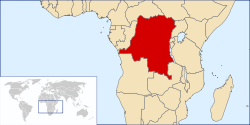
Greeks in the Democratic Republic of the Congo
Encyclopedia

Democratic Republic of the Congo
The Democratic Republic of the Congo is a state located in Central Africa. It is the second largest country in Africa by area and the eleventh largest in the world...
were established prior to the colonization of the country by Belgium. The Greek presence in the Congos reached a peak in the 1950s when many Greeks fled Egypt
Egypt
Egypt , officially the Arab Republic of Egypt, Arabic: , is a country mainly in North Africa, with the Sinai Peninsula forming a land bridge in Southwest Asia. Egypt is thus a transcontinental country, and a major power in Africa, the Mediterranean Basin, the Middle East and the Muslim world...
as their properties were seized by the nationalist government there. The Greek communities organized their own schools and churches and Greeks were active in trade, fishing, transport, coffee growing and the music industry.
History
In the early to mid 20th century nearly all Congolese cities on the Belgian side had a Greek community and usually all hailing from a particular part of Greece as people would arrive, get settled in and send for their families. By the 1920s there were established Greek fishing and trading communities in the trading cities of Luapula and KatangaKatanga Province
Katanga Province is one of the provinces of the Democratic Republic of the Congo. Between 1971 and 1997, its official name was Shaba Province. Under the new constitution, the province was to be replaced by four smaller provinces by February 2009; this did not actually take place.Katanga's regional...
, where the Greeks plied the river trade of the Congo
Congo River
The Congo River is a river in Africa, and is the deepest river in the world, with measured depths in excess of . It is the second largest river in the world by volume of water discharged, though it has only one-fifth the volume of the world's largest river, the Amazon...
, ranging as far as Zambia where many settled. The traders and fishermen developed a good and likable reputation and cultivated good relations with their Congolese and Zambian colleagues as they were always ready to offer help or lend their equipment and traditional Greek skills in net and boat making. Later the Congolese Greeks played a significant role in launching the country's important music tradition by founding several recording companies like Olympia, Ngoma, Opika and others. When the country declared its independence in 1960 there were violent clashes and uncertainty followed by three decades of authoritarian rule by Mobutu Sese Seko
Mobutu Sese Seko
Mobutu Sese Seko Nkuku Ngbendu wa Za Banga , commonly known as Mobutu or Mobutu Sese Seko , born Joseph-Désiré Mobutu, was the President of the Democratic Republic of the Congo from 1965 to 1997...
which led to the exodus of most Greek settlers and the decline of the Greek community. Today there are about 100 Greeks left in the capital Kinshasa
Kinshasa
Kinshasa is the capital and largest city of the Democratic Republic of the Congo. The city is located on the Congo River....
and 200 in Lubumbashi
Lubumbashi
Lubumbashi is the second largest city in the Democratic Republic of the Congo, second only to the nation's capital Kinshasa, and the hub of the southeastern part of the country. The copper-mining city serves as the capital of the relatively prosperous Katanga Province, lying near the Zambian border...
. The holy temple of Saint George and the Club Helleniqe are the focal points of the community. In response to the 2008 humanitarian emergency in the Congo
Democratic Republic of the Congo
The Democratic Republic of the Congo is a state located in Central Africa. It is the second largest country in Africa by area and the eleventh largest in the world...
Greece dispatched $500,000 in aid.
Language
Most Greeks speak French as their native language. Some can only speak GreekGreek language
Greek is an independent branch of the Indo-European family of languages. Native to the southern Balkans, it has the longest documented history of any Indo-European language, spanning 34 centuries of written records. Its writing system has been the Greek alphabet for the majority of its history;...
, with others speaking Bantu languages
Bantu languages
The Bantu languages constitute a traditional sub-branch of the Niger–Congo languages. There are about 250 Bantu languages by the criterion of mutual intelligibility, though the distinction between language and dialect is often unclear, and Ethnologue counts 535 languages...
.
See also
- Greek DiasporaGreek diasporaThe Greek diaspora, also known as Hellenic Diaspora or Diaspora of Hellenism, is a term used to refer to the communities of Greek people living outside the traditional Greek homelands, but more commonly in southeast Europe and Asia Minor...
- Greeks in South AfricaGreeks in South AfricaThe Greek community in South Africa numbers 130,000 people.-Notable people:*George Bizos - human rights advocate*Stanley Christodoulou - international boxing judge and referee*Ivan Gazidis - sports business executive...
- Greeks in ZimbabweGreeks in ZimbabweThe Greek community in Zimbabwe comprises about 2,500 of Greek origin, almost half of them from Cyprus. Zimbabwe currently hosts eleven Greek Orthodox churches and fifteen Greek associations and humanitarian organizations.-History:...
- Greeks in ZambiaGreeks in ZambiaThe Greek community of Zambia comprises about 800 people today, roughly half of whom hail from Cyprus. Most are concentrated in the capital Lusaka, while there are smaller enclaves in Luansia and Kitue.-Migration history:...

